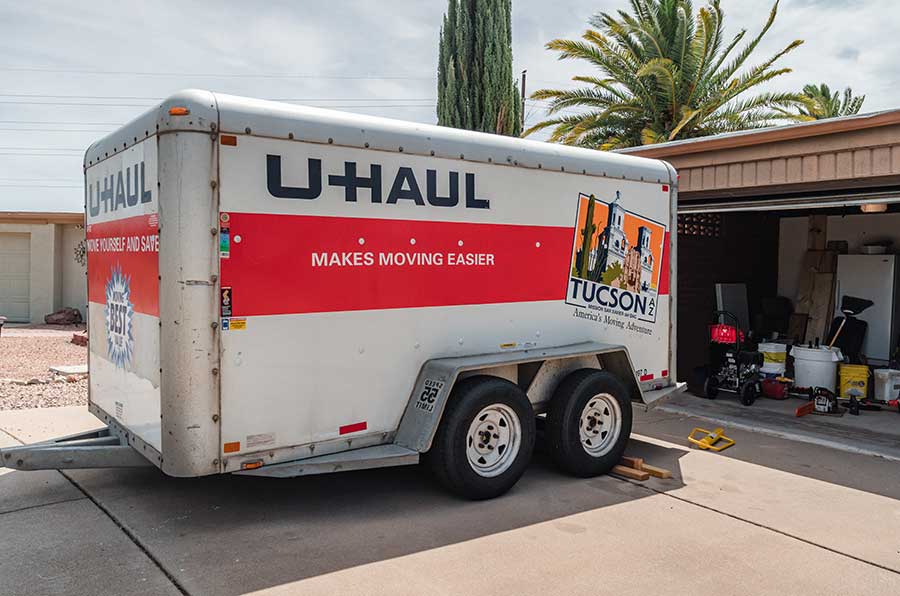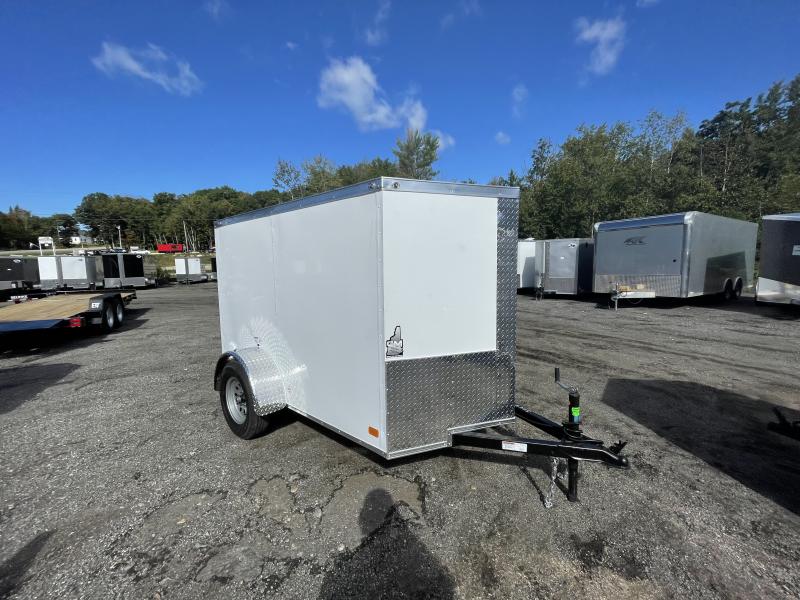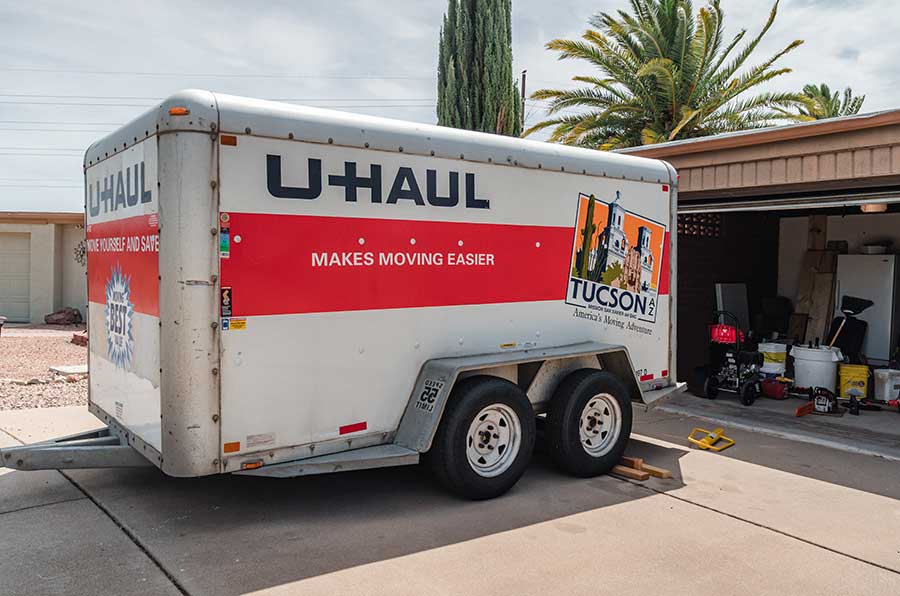Understanding U-Haul Cargo Trailers: Your Comprehensive Guide to Sizes, Usage, and Rentals cars.truckstrend.com
Introduction: Your Mobile Storage Solution
When it comes to moving, hauling, or simply needing extra space, U-Haul cargo trailers stand out as a highly versatile and cost-effective solution. Far more than just a box on wheels, these enclosed trailers offer a secure, weather-protected environment for transporting everything from household goods and furniture to equipment and supplies. Designed for convenience and accessibility, U-Haul’s range of cargo trailers empowers individuals and businesses to take control of their transportation needs, offering an alternative to hiring full-service movers or purchasing a dedicated hauling vehicle. This comprehensive guide will delve into every aspect of U-Haul cargo trailers, helping you understand their types, benefits, rental process, and how to use them safely and efficiently.
Understanding U-Haul Cargo Trailers: Your Comprehensive Guide to Sizes, Usage, and Rentals
Why Choose a U-Haul Cargo Trailer? Benefits & Advantages
Opting for a U-Haul cargo trailer presents numerous compelling advantages, making it a popular choice for a wide array of hauling requirements.
- Cost-Effectiveness: Compared to hiring professional movers or renting a large moving truck, a U-Haul cargo trailer can significantly reduce expenses. You only pay for the trailer itself, and you use your own vehicle to tow it, saving on truck rental fees and potentially fuel costs if your vehicle is more fuel-efficient.
- Protection from Elements & Theft: Unlike open utility trailers or truck beds, U-Haul cargo trailers are fully enclosed. This design protects your belongings from rain, snow, dust, and road debris, ensuring they arrive at their destination in the same condition they left. The secure enclosure also deters theft, offering peace of mind.
- Flexibility and Convenience: U-Haul’s extensive network of locations means you can typically pick up and drop off trailers at different points, accommodating one-way moves. Their flexible rental periods allow you to rent for a day, a week, or longer, tailoring the service to your schedule.
- Variety of Sizes: With several sizes available, you can choose a trailer that perfectly matches the volume and weight of your cargo, preventing wasted space or the need for multiple trips.
- Accessibility for DIY Movers: Most U-Haul cargo trailers can be towed by a wide range of personal vehicles, provided the vehicle meets the necessary towing capacity requirements. This makes them accessible to individuals who prefer to handle their own moves or transport tasks without needing a commercial driver’s license.
- No Fuel Costs for the Trailer: Unlike U-Haul moving trucks, the trailers do not require fuel, further contributing to their cost-effectiveness.

Exploring U-Haul Cargo Trailer Types & Sizes
U-Haul offers a selection of enclosed cargo trailers, each designed to meet specific hauling demands. Understanding the dimensions and capacities of each type is crucial for selecting the right trailer for your needs.
-
4′ x 8′ Cargo Trailer:
- Dimensions (Interior): Approx. 8′ L x 4′ W x 4.5′ H
- Cubic Feet: ~140 cu. ft.
- Max Load Weight: ~1,600 lbs
- Typical Use: Ideal for small apartments (studio, dorm room), hauling boxes, small furniture, or college moves. Fits a queen-size bed and frame.
- Features: Lightweight, easy to tow, typically has a low deck for easy loading.

-
5′ x 8′ Cargo Trailer:
- Dimensions (Interior): Approx. 8′ L x 5′ W x 5′ H
- Cubic Feet: ~200 cu. ft.
- Max Load Weight: ~1,800 lbs
- Typical Use: Suitable for small apartments (1 bedroom), appliances, motorcycles, or larger boxes. Can fit a king-size bed and frame.
- Features: Slightly larger capacity, still relatively easy to maneuver.
-
5′ x 10′ Cargo Trailer:
- Dimensions (Interior): Approx. 10′ L x 5′ W x 5.5′ H
- Cubic Feet: ~250 cu. ft.
- Max Load Weight: ~2,000 lbs
- Typical Use: Great for small homes (1-2 bedrooms), larger furniture pieces, multiple appliances, or small equipment. Some models may include a loading ramp.
- Features: Increased length provides more floor space for longer items.
-
6′ x 12′ Cargo Trailer:
- Dimensions (Interior): Approx. 12′ L x 6′ W x 5.5′ H
- Cubic Feet: ~390 cu. ft.
- Max Load Weight: ~2,500 lbs
- Typical Use: The largest enclosed option, perfect for 2-3 bedroom homes, large furniture sets, multiple appliances, or substantial equipment. Most models come with a built-in loading ramp for easy access.
- Features: Offers the most capacity, often equipped with a ramp for easier loading of heavy items or vehicles (like ATVs).

Renting a U-Haul Cargo Trailer: A Step-by-Step Guide
Renting a U-Haul cargo trailer is a straightforward process, but understanding the steps and requirements ensures a smooth experience.
- Determine Your Needs: First, estimate the volume and weight of your cargo to select the appropriate trailer size.
- Check Towing Vehicle Compatibility: Ensure your vehicle has the adequate towing capacity (check your owner’s manual) and is equipped with a properly installed hitch, a hitch ball (correct size for the trailer), and a working lighting connection (4-flat or 7-way wiring harness). U-Haul can help you assess your vehicle’s capability.
- Make a Reservation:
- Online: The easiest way is through the U-Haul website. Enter your pickup and drop-off locations, dates, and desired trailer size.
- Phone: Call U-Haul directly or your local U-Haul dealer.
- In-Person: Visit a U-Haul location.
- Booking in advance, especially during peak moving seasons (end of month, summer), is highly recommended.
- Pick Up the Trailer:
- Bring your driver’s license, reservation details, and the towing vehicle.
- A U-Haul representative will assist you in hooking up the trailer, ensuring the hitch connection is secure, the safety chains are crossed, and the lights are functioning. They will also provide instructions on proper loading and towing.
- Inspect the trailer for any existing damage before you leave and ensure it’s noted on your contract.
- Load and Tow: Load your cargo carefully, distributing weight evenly (slightly front-heavy is ideal, aiming for 60% of the weight in the front half). Secure all items to prevent shifting. Drive cautiously, remembering you’re towing a load.
- Return the Trailer: Return the trailer to the agreed-upon location by the due date. Ensure the trailer is empty and reasonably clean. A U-Haul representative will inspect it upon return.
Important Considerations for Safe & Efficient Towing
Towing a trailer requires careful attention to safety and proper technique.
- Vehicle Towing Capacity: Never exceed your vehicle’s Gross Vehicle Weight Rating (GVWR) or Gross Combined Weight Rating (GCWR). This includes the weight of the trailer, its contents, and the passengers/cargo in your towing vehicle.
- Hitch and Ball Size: U-Haul trailers typically use a 1-7/8" or 2" hitch ball. Ensure your hitch ball matches the trailer coupler and is securely tightened.
- Weight Distribution: Proper weight distribution is paramount for safe towing. Load heavier items low and centered over the trailer’s axle. Aim for approximately 10-15% of the total trailer weight (trailer + cargo) to be tongue weight (downward force on the hitch ball). Too little tongue weight can cause sway; too much can overload your vehicle’s rear suspension.
- Tires, Lights, and Brakes: Before each trip, check the tire pressure on both your vehicle and the trailer. Ensure all trailer lights (tail lights, brake lights, turn signals) are working correctly. While most U-Haul cargo trailers do not have independent braking systems, the towing vehicle’s brakes must be sufficient to stop the combined weight.
- Driving Techniques:
- Increase Braking Distance: Your stopping distance will be significantly longer with a trailer.
- Wider Turns: Account for the trailer’s path, especially when turning corners.
- Reduced Speed: Drive at a reduced speed, especially on highways, and be mindful of crosswinds.
- Lane Changes: Allow ample space when changing lanes.
- Backing Up: Practice backing up in an open area before attempting it in tight spots.
- Weather Conditions: Exercise extreme caution in adverse weather conditions like heavy rain, strong winds, or icy roads. Consider delaying your trip if conditions are severe.
- Insurance: U-Haul offers optional SafeTow® coverage that can protect you from financial liability for damage to the trailer. Check with your personal auto insurance provider to see if your policy extends coverage to towed trailers.
Tips for Maximizing Your U-Haul Cargo Trailer Experience
To make your rental experience as smooth and efficient as possible, consider these practical tips:
- Pack Smart: Use sturdy moving boxes, label them clearly, and pack heavy items in smaller boxes. Disassemble furniture where possible.
- Secure Your Load: Invest in moving blankets, furniture pads, and tie-down straps. Secure all items tightly to the trailer’s tie-down points to prevent shifting during transit, which can be dangerous.
- Plan Your Route: Avoid routes with sharp turns, steep inclines/declines, or low overhead clearances if you’re unsure. Consider rest stops and fuel stations that are trailer-friendly.
- Understand the Rental Agreement: Read the terms and conditions carefully, especially regarding rental duration, fuel policy (for your vehicle), and any additional charges.
- Clean Before Returning: While U-Haul doesn’t expect a spotless trailer, returning it reasonably clean can prevent potential cleaning fees.
- Check Accessibility: Ensure your destination has adequate space for maneuvering and parking the trailer.
Potential Challenges and Solutions
While generally straightforward, renting and using a U-Haul cargo trailer can present a few challenges:
- Availability Issues: During peak seasons (summer, end-of-month), trailers, especially popular sizes, can be scarce.
- Solution: Book your trailer as far in advance as possible. Be flexible with your pick-up or drop-off times/locations if feasible.
- Towing Vehicle Limitations: Your vehicle might not have the required towing capacity or the necessary hitch equipment.
- Solution: Always verify your vehicle’s towing capacity beforehand. U-Haul can install hitches and wiring harnesses if needed, but factor this cost and time into your plans.
- Learning Curve for New Towers: If you’re new to towing, the experience can feel daunting.
- Solution: Practice driving with the empty trailer in a safe, open area (e.g., large empty parking lot) to get a feel for braking, turning, and backing up. Watch U-Haul’s instructional videos.
- Damage or Accidents: Accidents can happen, and damage to the trailer or your belongings can be costly.
- Solution: Consider U-Haul’s SafeTow® coverage or verify your personal insurance coverage. Drive defensively and take all safety precautions.
- Cost Variations: Rental prices can vary based on location, demand, time of year, and whether it’s a one-way or round-trip rental.
- Solution: Compare prices for different dates and locations if your schedule allows. Booking online often provides the most up-to-date pricing.
U-Haul Cargo Trailer Estimated Price Table
Please note that these prices are estimates and can vary significantly based on location, availability, demand, rental duration (daily vs. weekly vs. monthly), and whether it’s a one-way or round-trip rental. Always check the U-Haul website or contact a local dealer for the most accurate and current pricing for your specific needs.
| Trailer Size | Interior Dimensions (L x W x H) | Cubic Feet (Approx.) | Max Load Weight (Approx.) | Typical Daily Rate (Estimated) | Typical Weekly Rate (Estimated) | Notes |
|---|---|---|---|---|---|---|
| 4′ x 8′ | 8′ x 4′ x 4.5′ | 140 cu. ft. | 1,600 lbs | $14.95 – $19.95 | $80 – $110 | Lightweight, easy to tow. Ideal for small loads. |
| 5′ x 8′ | 8′ x 5′ x 5′ | 200 cu. ft. | 1,800 lbs | $19.95 – $24.95 | $110 – $140 | Good for small apartments, appliances. |
| 5′ x 10′ | 10′ x 5′ x 5.5′ | 250 cu. ft. | 2,000 lbs | $24.95 – $29.95 | $140 – $170 | More length for larger items. Some models with ramp. |
| 6′ x 12′ | 12′ x 6′ x 5.5′ | 390 cu. ft. | 2,500 lbs | $29.95 – $39.95 | $170 – $220 | Largest enclosed option, often with ramp. |
Disclaimer: Prices are highly variable and serve only as a general guide. Factors like demand, one-way vs. round-trip, and specific location can drastically alter the final cost. Additional charges for insurance, taxes, and environmental fees may apply.
Frequently Asked Questions (FAQ)
Q1: What do I need to tow a U-Haul cargo trailer?
A1: You need a vehicle with sufficient towing capacity, a properly installed hitch receiver, a hitch ball (1-7/8" or 2" depending on the trailer), and a working lighting connection (usually a 4-flat or 7-way wiring harness). U-Haul can help you verify your vehicle’s compatibility.
Q2: Do U-Haul cargo trailers have brakes?
A2: Most U-Haul cargo trailers do not have independent braking systems. The towing vehicle’s brakes are designed to stop the combined weight. The 6’x12′ cargo trailer, being the largest, might have surge brakes on some models, which activate automatically when the towing vehicle slows down. Always check with U-Haul for specific trailer features.
Q3: Can I tow a U-Haul trailer with a car?
A3: Yes, many cars (sedans, SUVs) can tow smaller U-Haul cargo trailers (like the 4’x8′ or 5’x8′) provided they meet the vehicle’s specific towing capacity requirements and are equipped with the necessary hitch and wiring. Always consult your vehicle’s owner’s manual for its maximum towing capacity.
Q4: How far in advance should I book a U-Haul cargo trailer?
A4: It’s recommended to book as far in advance as possible, especially during peak moving seasons (summer months, weekends, end of the month) or if you need a specific size. A week or two in advance is generally a good idea, but even a few days can make a difference.
Q5: What if I need to extend my rental period?
A5: Contact U-Haul as soon as you know you’ll need more time. Extensions are usually possible if the trailer isn’t booked by another customer, though additional charges will apply.
Q6: Do I need insurance for a U-Haul cargo trailer?
A6: While not always mandatory, it’s highly recommended. Your personal auto insurance policy may or may not cover rented trailers. U-Haul offers optional SafeTow® coverage that provides protection against damage to the U-Haul trailer. It’s best to check both your personal policy and U-Haul’s offerings to ensure adequate coverage.
Q7: Are U-Haul cargo trailers waterproof?
A7: U-Haul cargo trailers are designed to be weather-resistant and provide significant protection from rain and snow. While generally very effective, like any trailer, extreme conditions or prolonged exposure could theoretically lead to minor leaks. For sensitive items, it’s always wise to pack them in waterproof containers or wrap them in plastic.
Conclusion: Empowering Your Hauling Needs
U-Haul cargo trailers offer an invaluable service for anyone needing to transport goods securely, efficiently, and affordably. From the compact 4×8 for a small apartment move to the spacious 6×12 for larger household transitions, there’s a U-Haul cargo trailer designed to meet diverse needs. By understanding the different types, the rental process, and crucial safety considerations, you can leverage these versatile trailers to simplify your hauling tasks. Remember to plan ahead, prepare your towing vehicle, and prioritize safety on the road. With the right U-Haul cargo trailer, your next move or transport project can be a smooth and successful endeavor.




